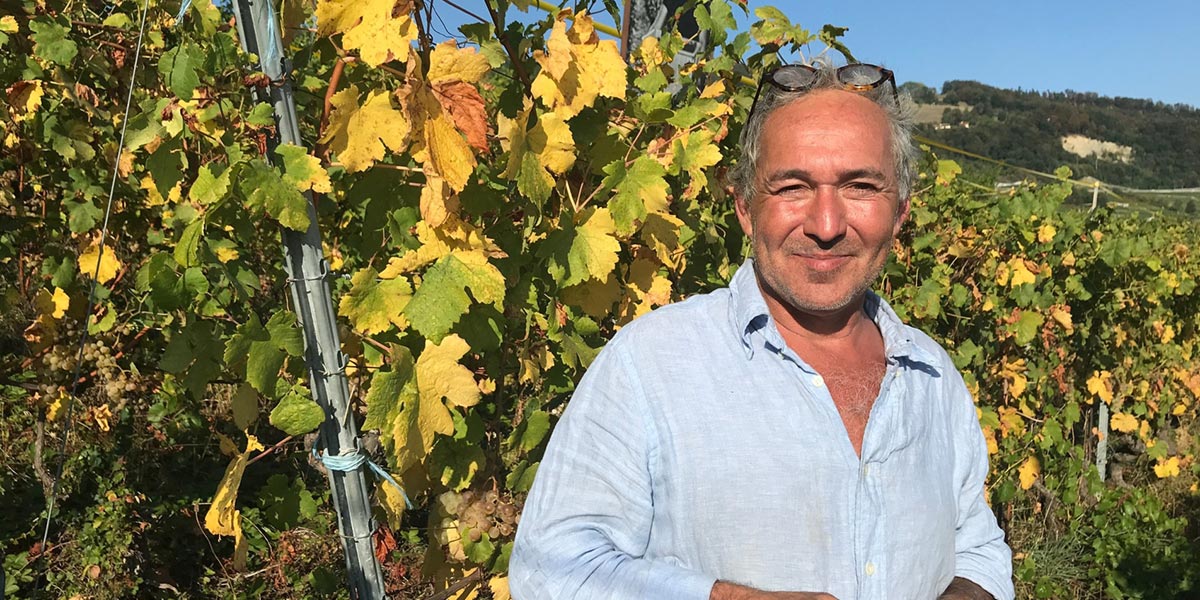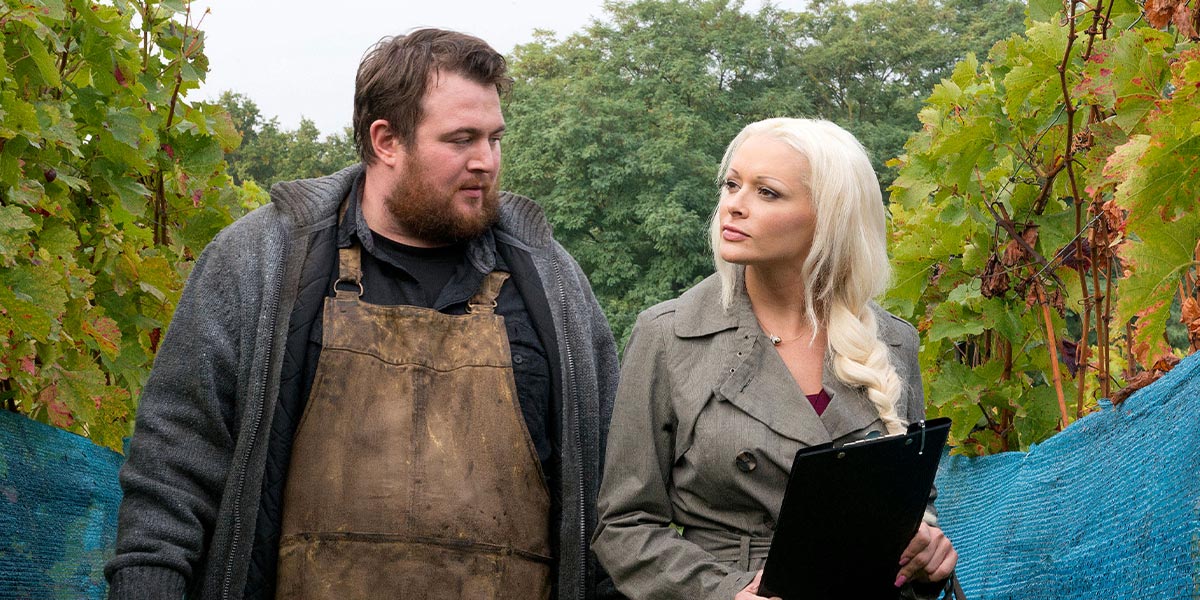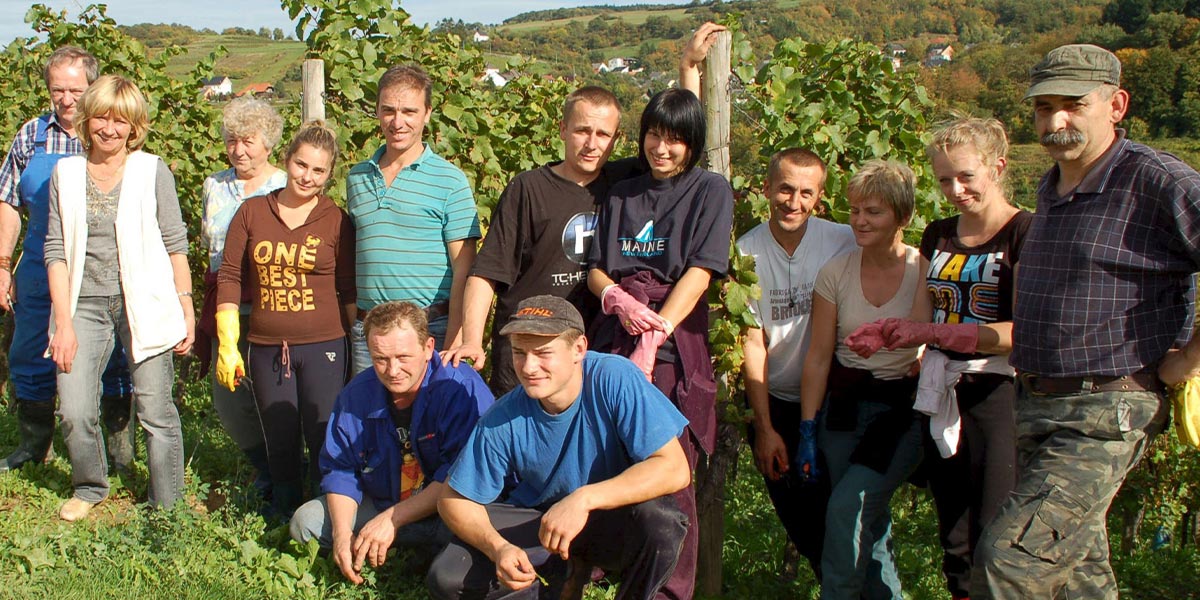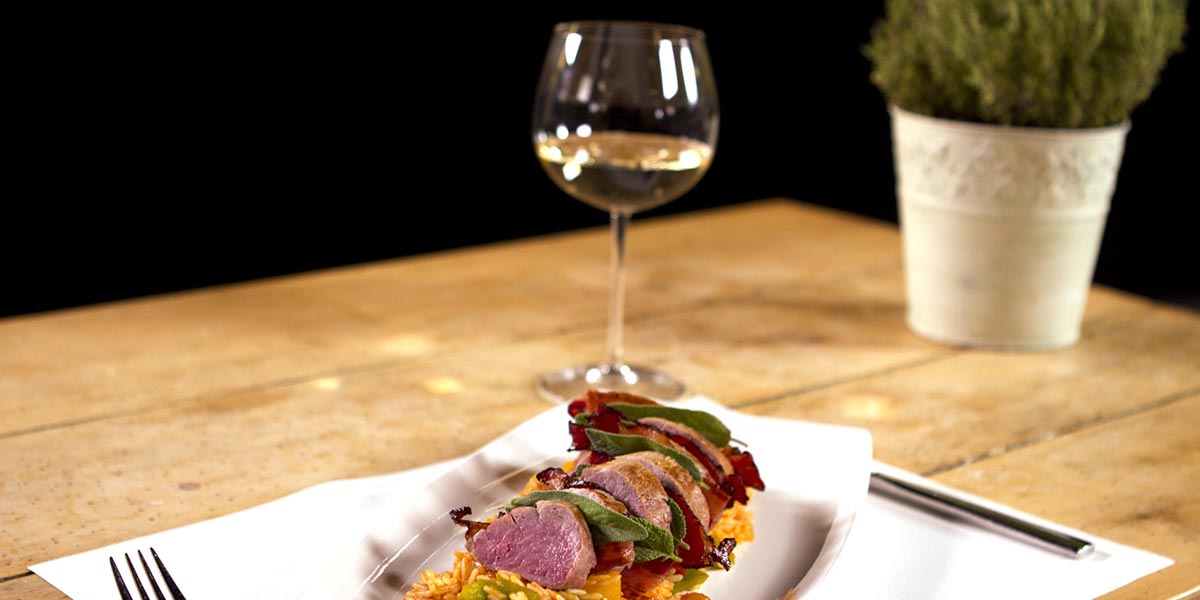SWR, 7.35 a.m.
Delaware is known as a tax haven, but excellent wines also grow on its coast. Peggy Raley started with just a few vines and still had to make sure that wine growing was legalised in the Puritan state. Today, her farm is known throughout the East Coast.
arte, 8.05 a.m.
Crémant is on the rise. Like champagne, this sparkling wine is also produced according to the "champagne process". The traditional bottle fermentation produces some spectacular drops, and as "Crémant brut" they are certainly comparable to a real champagne. One of the most exciting French sparkling wines today is the Alsatian Crémant, because the region near the Rhine on the border to Germany has particularly diverse soils. 360° Geo Reportage" traces crémant in various Alsatian wine-growing regions.
3sat, 9.35 a.m.
Whether it's Lake Sils in the Engadine or Lake Geneva: Switzerland's lakes show their best side in spring. The people on their shores live in harmony with nature.
 |
hr television, 2.50 p.m.
Cape Town is considered one of the most beautiful cities in the world. All around, enjoyment is not neglected, for example during a visit to one of the legendary wine estates.
tagesschau24, 23.35 hrs
Sark, the small island in the English Channel, was Europe's last feudal state. Once a British crown estate, the first democratic elections were held here only 10 years ago. Life was simple and based more on mutual trust than law. But a new power is changing tranquil island life: Two billionaires start buying up the land, planting vineyards and acquire four of the six hotels. Their companies now own a third of the total land area.
hr, 10.05 a.m.
Englishman Stuart Pigott is one of the most renowned experts when it comes to German wine. In a journey across Germany he is on the trail of the "wine miracle Germany". For Pigott, one thing above all applies: the wine must taste good to those who drink it - they should only know why. Stuart Pigott explains what the renaissance of Riesling is all about together with winegrowers such as Cornelia Heymann and Reinhard Löwenstein in Winningen on the Mosel, Dr. Martin Tesch from the Nahe and Ernst Loosen from the Dr. Loosen winery on the Mosel as well as J. L. Wolf in Wachenheim in the Palatinate.
Das Erste (ARD), 2.15 a.m.
"Blond doesn't mean stupid" is what Mayor Runge and his assistant Kai have to learn when they try to do an international business deal with the city treasury. It involves oil, a vineyard and the beautiful Palatinate town of Hattenstein.
 |
arte, 13.00
The sun shines warmly on the rocky slopes, vineyards and villages of the Luberon. The sweet life in the southern French region inspires not only tourists.
SWR, 7.15 a.m.
Black Forest and Westerwald, the orchards at Lake Constance and in Rheinhessen, the vineyards between Kaiserstuhl and Ahr, sheep and goat farms between the Swabian Alb and Hunsrück. The stories of the farms are as diverse as the landscapes. Some have been family-owned for generations - like the Guckertshof in Mannheim or the Hofgut Eichen in Rehlingen in Saarland. Here, the farmers continue old traditions - or revive them. The Hoffmann family, for example, has been growing wine again for a few years. Other farms that lacked successors have been taken over by "new farmers", such as the Reyerhof in Stuttgart. 400 members have founded a "solidary agriculture" in which people once again feed themselves directly from their own farm. The winemaker's daughter and former wine queen Julia Bertram has founded her own winery. Her Pinot Noirs from the Ahr are award-winning and are now enjoyed in Scandinavia with herring or in Japan with Kobe beef. The documentary takes viewers into the world of farming in the southwest. They experience farms and fields, people, animals and their stories in images from the air, on the pastures and between the furrows - in unique shots from 100 years of film history.
BR, 10.05 p.m.
Deep under the Würzburg Residenz, people laugh, celebrate and taste wine between centuries-old barrels at the start of Shrovetide. But who cleans up after the party? No one would be better suited for this than Franconia's "Putzfraa" Ines Procter. The star from Veitshöchheim discovers one or two leftovers from the party. Reason enough to remember the colourful performances of the "Närrische Weinprobe 2020". At that time, old-established "Fosenöchter" such as Fredi Breunig or Doris Paul were on stage alongside the carnival icon Michl Müller.
NDR, 8.30 a.m.
Visitors can expect a fascinating volcanic landscape with fertile soils used by winegrowers, bizarre rock formations and beautiful beaches.
SWR, 11.45 a.m.
The men's flat-sharing community of Thomas, Blasius and Paul is deeply saddened by the tragic death of Claudia. Thomas keeps trying to lighten the mood, but he can't really get through to Paul, who feels guilty about his mother's death.
Tagesschau24, 9.45 p.m.
Ischia has always been an island to stay. Greek sailors landed here around 3,000 years ago (the real core of the "Odyssey"), founded a colony and planted their wine on the fertile volcanic soil.
hr television, 10.00 a.m.
"The Germans also make red wine", French winegrowers were amused twenty years ago. Indeed, German red wine was thin-coloured and sweet and sour, according to Stuart Pigott a "chamber of horrors of reddish wine". Pigott shows that everything is different today with visits to winemakers Meike and Werner Näkel of Meyer-Näkel in Dernau on the Ahr, Thomas Hensel in Bad Dürkheim in the Palatinate and Gert Aldinger, a revolutionary of the first hour, in Fellbach near Stuttgart.
arte, 7.10 a.m.
3sat, 11.45 a.m.
The Wachau - the Danube valley between Melk and Krems - is one of the oldest cultural landscapes in Europe with a wine-growing tradition that goes back almost two millennia. It is a region of nostalgia and clichés and at the same time a lively and powerful living space where very special wines thrive and exceptional winemakers are at work. The documentary takes us to one of the most famous vineyards near Weißkirchen. There the team meets a terroir specialist who knows all about the influences that give wine its character. After a ride on the Wachau Railway, the team stops at the Domäne Wachau near Dürnstein.
arte, 7.40 p.m.
The climate zones for vine plants are moving northwards, while winegrowers in southern Europe have to fear for their existence. So Anne Engrav hoped for the first successful harvest in Norway in 2019. Climate change is still an advantage for most vintners. The hot summers of recent years have produced great vintages. Nevertheless, Spanish and German winegrowers also have to use ideas and passion to face the challenges of global warming. Researchers at Geisenheim University of Viticulture have long warned of negative consequences: Late frost in spring and heavy rain in summer.
BR, 8.15 p.m.
The "Närrische Weinprobe" (Foolish Wine Tasting) from the Staatliche Hofkeller of the Residenz in Würzburg offers genuine Franconian originals. A production in cooperation with the Fastnacht-Verband Franken e.V. At this year's wine tasting, the artists in the Staatlicher Hofkeller Corona are more or less among themselves. Nevertheless, there will once again be a colourful mixture of wordplay, music and wine in the atmospheric ambience. Bacchus and the cellar spirits will listen to the jokes and enjoy themselves.
3sat, 6.05 a.m.
Almost every year it, or rather she, erupts once. Since the upper part of Etna has been declared a national park, the dangers for local residents are limited. However, if the flanks of the lower regions burst open, there is almost nothing that can stop the flow of lava. The winemaker Chiara Vigo remembers how, as a child, she had to witness an eruption in the north near Randazzo that destroyed almost all of her family's vineyards: a catastrophe, because even today there is no insurance against it on Etna. She will never forget that the lava flow left a remnant of their belongings and "miraculously" suddenly changed direction, as Chiara recounts in the film. Together with her husband Gianluca, she now grows "Nerello Mascalese" here, the typical red grape variety of the 130 or so vintners on Etna. She appreciates that the volcano not only takes but also gives. The fertile and mineral-rich volcanic soil makes it possible to grow wine, olives, pistachios and many other things that make up Sicilian cuisine.
.jpg) |
SWR, 11.45 a.m.
Thomas does everything he can to get Paul to appear at the upcoming court case, but his son still remains missing. When Thomas wants to hire a lawyer as a precaution, he finds out that Paul has already hired someone: the shyster lawyer Andreas Koblenz. To make matters worse, shortly before his disappearance Paul has leased the vineyards he inherited from his mother to Georg Plattner.
WDR, 11.45 a.m.
Why is it so beautiful on the Rhine? Many have already tried to answer that. We try again. With stories between Koblenz and Nijmegen - emotional, extraordinary, bizarre stories! Because everywhere along the Rhine there are people who achieve amazing things with great energy. Beate Döring, for example. The farmer keeps a herd of Asian water buffalo on the banks of the Rhine opposite Wesel. Huge but relaxed animals that help to preserve nature along the Rhine in the wet terrain. Or Kay Thiel from Niederdollendorf. As a part-time vintner, he has recultivated an ancient vineyard in the Siebengebirge. Many plots in the steep vineyards of the Siebengebirge were abandoned decades ago because they were too labour-intensive. But since more and more high-quality wines are in demand, cultivation has become worthwhile again. Now rare grapes thrive below the Petersberg, which Kay Thiel harvests together with friends.
3sat, 11.45 a.m.
If Europe should have a soul, then perhaps it hovers above the vineyards on the Luxembourg Moselle. This is where the old Europe comes together, France, Germany, Benelux. You can tell by the language Letzeburgisch, and you can see it too: the gently rolling Moselle valley is reminiscent of the Rhine, the Rhone and the Ardennes all at once. This time, "At Table in..." visits the Schumacher winegrowing family from Wormeldingen in Luxembourg. In Luxembourg, at some point people stopped deciding between the Germanic and the Romance. Here, both are combined, and the people of Letzeburg are proud of that. You not only notice it in the language, you also taste it.
 |
arte, 7.05 a.m.
hr, 9.16 am
Finger food is particularly suitable for New Year's Eve celebrations. You can eat it quickly standing up, you don't need so much crockery, and it's easy to prepare. The chefs at the Sheraton Hotel at the airport have a lot of experience with this and will show you what variations there are and how to prepare them.
hr, 10.00 a.m.
Can German wine from the supermarket meet high standards in terms of quality and taste? All of Germany's discounters together account for almost two-thirds of the German wine trade in terms of purchasing volume. To take a look at large-scale production, Stuart Pigott travels the country and collects German wines between 1.99 euros and 6.90 euros, which he blind tastes at the end of the trip with Berlin wine fanatic Roy Metzdorf at the "Weinstein". A "pirate" of the twenty-euro price range is smuggled in between the inexpensive wines. Can Pigott and Metzdorf taste the differences?
3sat, 11.45 a.m.
The Leithagebirge and Lake Neusiedl characterise the wine-growing region of Neusiedlersee Hügelland. Quartz, mica slate and above all shell limestone from the former primeval sea determine the geology here. For "Eingeschenkt" Birgit Braunstein and Heidi Schröck go into the vineyards with a wheelbarrow and a spade to bring to light the secret of the soil at the Leithagebirge, which becomes visible where only the roots of the vines reach. Wines that emerge from this are terroir wines as they are written in the book. That is why the Leithaberg DAC focuses on the origin - and not on the grape varieties, of which there are many here, especially in the white area.
 |
ARD-alpha, 1.30 p.m.
Werner Holzfeind is the winegrower with perhaps the highest vineyard in Austria.
hr, 11.45 a.m.
Thomas and the family stand by Paul in his court case for the negligent killing of his mother. There is great relief when Paul is acquitted of any guilt. But immediately afterwards Thomas is suspected of being behind the attacks that continue to be made on the mayoral candidate Georg Plattner.
hr, 4.45 p.m.
When you think of Frankfurt tradition, the first thing that comes to mind is apple wine. It is served in pubs and in ambitious inns. But there are also other traditions: The Nibelungenschänke has been a fixture in the Nordend for over 35 years. The noble Greek cooks unchanged good food and has loyal regulars. In Sachsenhausen, an Austrian restaurant maintains the tradition of the Heuriger with typical dishes - served in dirndl.
3sat, 1.20 pm
Author Ulrike Bremer visited Thailand's only vineyard, was in the jungle in the hinterland and at an elephant polo tournament.
hr, 10.05 a.m.
The beginnings of organic wine were in the 1970s. At that time, this wine usually tasted simple and acid. Today, wine from organic cultivation is often not only good, it also sells well. Organic wines are not only available in organic supermarkets, but in almost every shop that sells wine. Is the label "organic wine" just a successful marketing strategy? It is true that "eco" helps to sell to a certain clientele. But it is also true that many renowned wineries and many young winegrowers have converted to organic winegrowing out of conviction. One of the pioneers is the traditional winery "Ökonomierat Rebholz" in the Palatinate. Other examples of large and well-known ecologically oriented wineries are Clemens Busch in Pündrich on the Moselle and the Dr. Randolf Kauer winery in Bacharach on the Middle Rhine. Stuart Pigott meets the expert on biodynamic viticulture, Georg Meißner, to exchange ideas on this topic in the notorious Drosselgass' in Rüdesheim on the Rhine.
3sat, 11.45 a.m.
Of Austria's three wine-growing regions, Bergland is the least known. It comprises the provinces of Carinthia, Salzburg, Upper Austria, Tyrol and Vorarlberg. Until the 17th century, there were also vineyards in the southernmost and western provinces. Climate shifts and economic crises pushed viticulture out of these cooler regions. But small islands of viticulture are benefiting from global warming today. Thus, new vineyards are being wrested from the soil, land by land. Where is the renaissance taking place, and what can the new wine from the mountains do?
BR, 3.30 p.m.
Deep under the Würzburg Residenz, people laugh, celebrate and taste wine between centuries-old barrels at the start of Shrovetide. But who cleans up after the party? No one would be better suited for this than Franconia's "Putzfraa" Ines Procter. The star from Veitshöchheim discovers one or two leftovers from the party. Reason enough to remember the colourful performances of the "Närrische Weinprobe 2020". At that time, old-established "Fosenöchter" such as Fredi Breunig or Doris Paul were on stage alongside the carnival icon Michl Müller.
3sat, 5.00 p.m.
The Azores islands rise out of the Atlantic as the peaks of huge underwater volcanoes. The evergreen archipelago in the middle of the ocean attracts visitors with fascinating landscapes and idyllic villages, tours to extinct volcanoes, bathing in hot springs and hiking through forests and vineyards.
arte, 2.45 p.m.
The Rhine valley behind Bingen is considered the epitome of the German soul. The Rhine is now more than halfway to the North Sea. It has become a proud river - and provides material for sagas, operas and wars. In the Middle Rhine Valley there are castles by the kilometre and wine, which the Romans brought to the north 2,000 years ago. The mineral-rich slate soils in the Rhine Valley are ideal for growing wine. Bacharach also owes its wealth to grapes. The surrounding vineyards, steeply sloping and rich in tradition, are often still family-owned.
3sat, 4.45 p.m.
Among the secrets of the wintry city forest on the Kapuzinerberg are Europe's only chamois in a city area. As unique as the vineyard on the Mönchsberg opposite.
hr, 2.45 p.m.
Film author Katja Devaux drives the Via Aurelia south and also discovers the hinterland of the coast with its medieval towns and many delights. Only an hour away from the Tuscan coast is the island of Elba with its various wineries. Even the Romans and the Etruscans appreciated the island's mild climate.